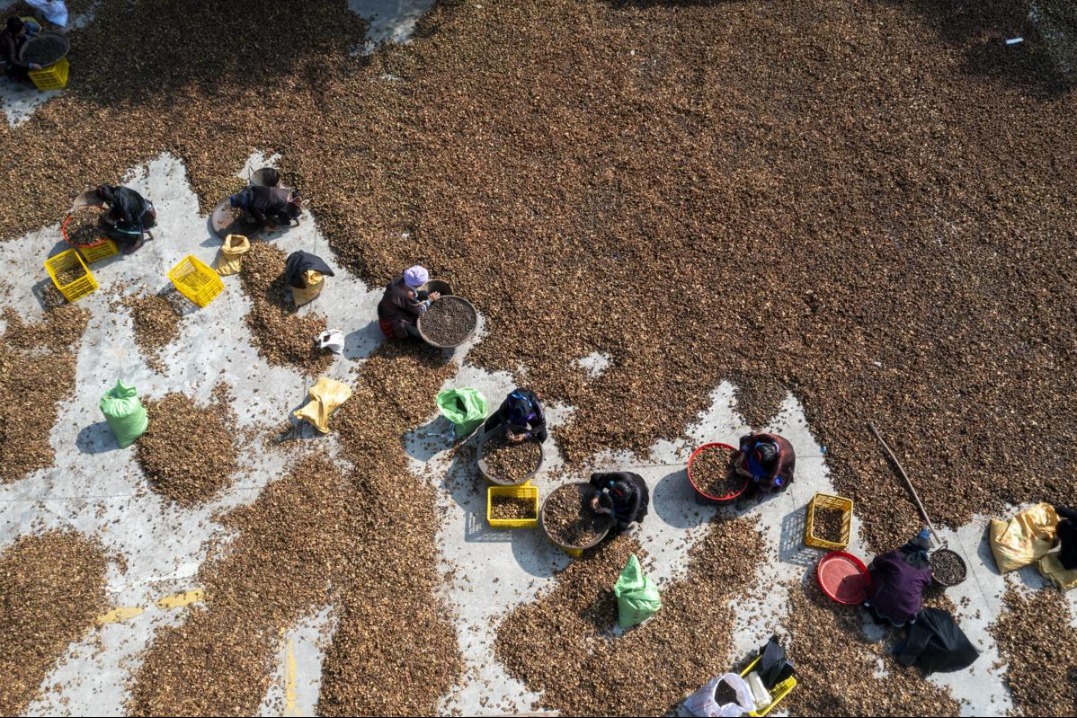Expert finds many reasons to hail China
Brazilian coordinator says Global South can take cue from Chinese development


Brazilian Melissa Cambuhy, who calls herself a Marxist, said her keen interest in Chinese socialism led to finding her mission in life: strive for improved partnership between China and Brazil.
Her winding path has earned her different titles: lawyer, professor, researcher, and PhD candidate in international relations at Rio de Janeiro State University. Cambuhy is also the coordinator for Brazil-China International Cooperation as well as the Working Group Brazil-China Dialogues on Global Development and Governance at the Lula Institute in Sao Paulo.
She said, "I'm a Marxist, and it sparked an interest in Chinese socialism. So, the first thing that got my attention was this socialist experience that I would like to learn more about. Then I started researching and studying China-Brazil relations and working with international cooperation. So, one thing was becoming all these other things, but the first thing that developed my interest in China was its socialism."
At first, she was interested in law and development, but soon China's development story caught her eyes. By the time she was getting her master's degree, her thesis was examining how China was building a harmonious society.
Cambuhy's focus gradually shifted toward contemporary China, and she started to lecture about China's political economy and development.
Her research into China's development led to some realizations.
"I think that this Chinese experience can offer some important lessons to the Global South," she said. "The Global South countries can look up to the Chinese experience and realize that there are a lot of other ways for development in the world.
"The North, they tried to convince us — the Global South and Brazil — that capitalism would be enough to bring development to Brazil and the other countries. But it didn't work for us," she said.
Cambuhy didn't imply that Brazil should do exactly what China did.
According to her, for example, Brazil has its own problems such as "great racial inequality" with a history of slavery. She said that she believes in the "Chinese experience and the power of Chinese socialism "and in that China has shown that "there is another way", and Brazil can learn and build its own path of development.
Her research on China led her to another pursuit: international relations. She is pursuing a PhD degree in the field, with a focus on cooperation between Brazil and China. For the doctoral program, Cambuhy took a position last December as visiting researcher with the Chinese Academy of Social Sciences in Beijing and spent six months studying on China.
The connections she made in Beijing gave her opportunities to facilitate exchanges between Brazil and China, she said, adding a CASS delegation visited Brazil in September.
Having made friends with some of the delegation while in Beijing, Cambuhy coordinated the signing of a memorandum of understanding between her school, Rio de Janeiro State University and CASS.
"I'm really happy that I could have them in Rio de Janeiro, and I could build this partnership between both institutions," she said.
Cambuhy also said that she was delighted by her social life in Beijing.
"I lived in a hutong in Beijing. It was a great experience because I had a deep interest in the Chinese way of life. I was living in a very traditional city of Beijing, and at a really traditional place that is the center of the city in the hutongs," Cambuhy said.
Cambuhy took her daughter, Helena, with her to Beijing. Living among Chinese people, she said she could truly experience the Chinese way of life, "and I love it".
"I can't speak Chinese, but there is something very special about Chinese people because even if you can't speak Chinese, they will try to communicate with you," she said.
She hired an a-yi, or babysitter in Chinese to take care of her daughter. "People asked me, 'How can you have a Chinese a-yi when you can't speak Chinese?' I told them, at first, we used the translator but then we started communicating with our hearts. I could communicate with people like that in some moments," Cambuhy said.
The first words her daughter uttered were Chinese — a-yi and ni hao (how are you?). "People in our neighborhood talked to her, and I'm sure that she could understand them. She made a lot of old friends there," she added.
A grandfather living across the alley would often take Helena for a walk around the hutong in the morning while Cambuhy was leaving for work at the academy. Sometimes, she would also take her daughter to play in the nearby park.
"Our normal days in the hutong were like that," she said. "Helena was so happy in the hutongs."
She visited a few other places in China and was delighted by the beauty of Gulangyu Island in Fujian province. However, what impressed her the most was how Chinese people live.
She plans to spend more time to learn about China and wants to return there in a few years when her daughter is a little older so that Helena could attend a public school in China. Cambuhy said she wants her daughter to live in a safer social environment.
"China has a lot of opportunities to explore in terms of cooperation, so I'm trying to help Brazil to explore all these opportunities. I really love Chinese people, and I love living in China, and I love Brazil. I have a big commitment with my country, so I hope that I can spend my whole life working in this partnership," said Cambuhy.





































